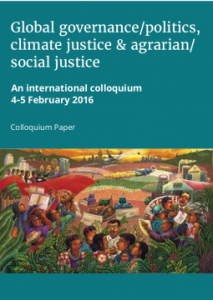Land Confiscations and Collective Action in Myanmar’s Dawei Special Economic Zone Area: Implications for Rural Democratization
By International Institute of Social Studies • February 4, 2016 The recent political and economic liberalization in Burma/Myanmar, while indicative of some positive steps toward democratisation, has increased foreign and domestic investments and geared the economy toward industrialisation and large-scale agriculture. Land governance procedures and implementation tend to favour the more powerful and well-connected, with little protection mechanism for the majority smallholding farmers in the country.
The recent political and economic liberalization in Burma/Myanmar, while indicative of some positive steps toward democratisation, has increased foreign and domestic investments and geared the economy toward industrialisation and large-scale agriculture. Land governance procedures and implementation tend to favour the more powerful and well-connected, with little protection mechanism for the majority smallholding farmers in the country.
The recent political and economic liberalization in Burma/Myanmar, while indicative of some positive steps toward democratisation after decades of authoritarian rule, has simultaneously increased foreign and domestic investments and geared the economy toward industrialization and large-scale agriculture. In rural areas, new institutional frameworks governing land, including a new Farmland Law (2012) and Vacant, Fallow and Virgin Lands Management Law ( 2012) have effectively created a land market through private land-use property rights and a new registration system with new land administration bodies. In a country permeated by legacies of corruption, coercion and military-linked cronies, land governance procedures and implementation tend to favour the more powerful and well- connected, with little protection mechanism for the majority smallholding farmers in the country.
The Dawei Special Economic Zone (SEZ), in the southern Thanintharyi division of Myanmar, to be developed trilateraly with Thai, Myanmar and Japanese investment, is set to become one of the largest industrial zones in Southeast Asia, covering an area of approximately 200km 2 . The project plan includes a deep sea port, industrial estate, power plant and cross-border road and rail link to Thailand. The development of the SEZ, together with land speculation in surrounding areas and other confiscations linked to agricultural concessions, mining and military constructions has been met with collective mobilizations. The paper argues that although resistance against land confiscations are increasingly linked to global trends, such reactions are also responding to an expanding opportunity structure in the national political context.
Collective action in the Dawei area takes advantage of histories of activism linked to democratic movements as well as human rights repertoires, social networks and trainings across the border in Thailand. Smallholding farmers, in alliance with activists, are also contesting land confiscations conducted by the military in the 1990s, encouraged by a greater political liberalization and testing the grounds for protest and engagement with the state. These contestations have implications for democratization and the transition of state-society relations more broadly. Although embedded locally, this process engages with transnational networks and alliances as well as global frameworks such as human rights, livelihoods and sustainable development.
This paper was published as part of the 2 day Colloquium Global governance/politics, climate justice & agrarian/social justice and selected for republishing on the TNI website. All papers can be found at the website of ISS.
Download the full paper here.
Tags: ASEAN, Business and Human Rights, Environmental and Economic Justice, Human Rights, International Institute of Social Studies, National League for DemocracyThis post is in: ASEAN, Business and Human Rights, Economy, Environmental and Economic Justice, Health, Human Rights, International Relations, Law
Related PostsBurma Partnership Celebrates Continuing Regional Solidarity for Burma and Embraces the Work Ahead for Progressive Voice
Myanmar’s New Dawn :Opportunities for Aung San Suu Kyi and U.S.-Myanmar Relations
Expanding People’ Solidarity for a Just and Inclusive ASEAN Community
Civil society launches #FreeThe5KH campaign in support of the imprisoned ADHOC staff and NEC official
Myanmar logging ban a major step to forest sector reform









 All posts
All posts